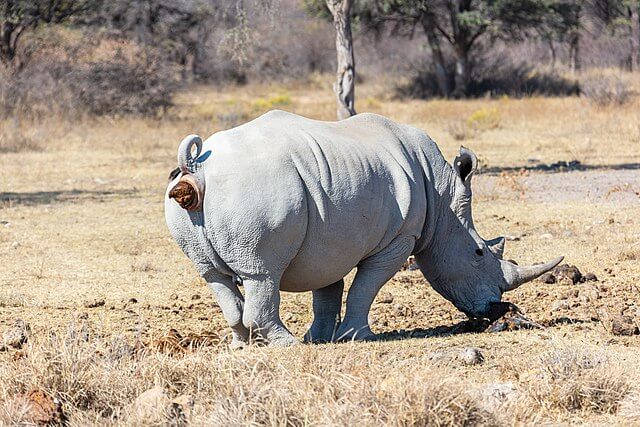
African Parks, a prominent conservation group, has unveiled ambitious plans to rewild 2,000 southern white rhinos in response to the pressing threat of poaching. This initiative follows their acquisition of the world’s largest private captive rhino breeding operation in South Africa, known as Platinum Rhino, which spans 7,800 hectares (19,000 acres) and was facing financial challenges.
The southern white rhinos, the second-largest land mammals globally, are classified as a near-threatened subspecies, with an estimated 18,000 individuals remaining. African Parks intends to execute this rewilding effort over the course of the next decade, with the goal of restoring these majestic creatures to their natural habitats.
The organisation has secured emergency funding to purchase Platinum Rhino, and this endeavour represents one of the most extensive continent-wide rewilding programs for any species.
CEO Peter Fearnhead said they initially had no intention of owning of a captive rhino breeding operation however they “fully recognise the moral imperative of finding a solution for these animals, so that they can once again play their integral role in fully functioning ecosystems”.
Their strategy entails releasing the rhinos into secure, well-managed areas to shield them from the perils of poaching. African Parks plans to collaborate with funding partners, governments, and other conservation groups to ensure the success of this endeavour.
John Hume, the previous owner of Platinum Rhino, is recognised for his conservation efforts but has also faced criticism for advocating the trade in rhino horn. He argued that this approach was essential to protect his rhinos from poaching and to generate funds for the maintenance of the rhino farm.
The southern white rhino population reached a critical low in the 1930s, with only 30 to 40 individuals. However, through effective conservation measures, their numbers rebounded to over 20,000 by 2012. In stark contrast, the northern white rhino subspecies has only two surviving members, both females residing in Kenya. Rhino-horn poaching has pushed them to the brink of extinction.
The majority of southern white rhinos are concentrated in South Africa, Namibia, Zimbabwe, and Kenya. The International Union for Conservation of Nature designates a species as “near-threatened” when it is believed to be at risk of vulnerability in the near future. African Parks’ ambitious rewilding project holds the promise of rejuvenating the southern white rhino population and fortifying their chances of survival.
——————————————————————————
At Natural World Fund, we are passionate about stopping the decline in our wildlife.
The decline in our wildlife is shocking and frightening. Without much more support, many of the animals we know and love will continue in their decline towards extinction.
When you help to restore a patch of degraded land through rewilding to forests, meadows, or wetlands, you have a massive impact on the biodiversity at a local level. You give animals a home and food that they otherwise would not have had, and it has a positive snowball effect on the food chain.
We are convinced that this is much better for the UK than growing lots of fast-growing coniferous trees, solely to remove carbon, that don’t actually help our animals to thrive.
This is why we stand for restoring nature in the UK through responsible rewilding. For us, it is the right thing to do. Let’s do what’s right for nature!
Donate today at https://naturalworldfund.com/ and join in the solution!

